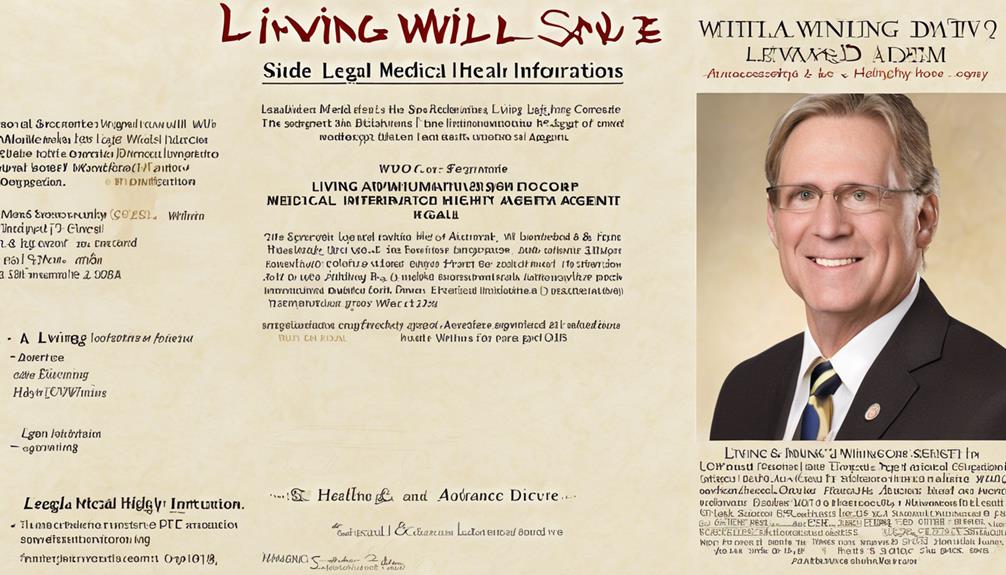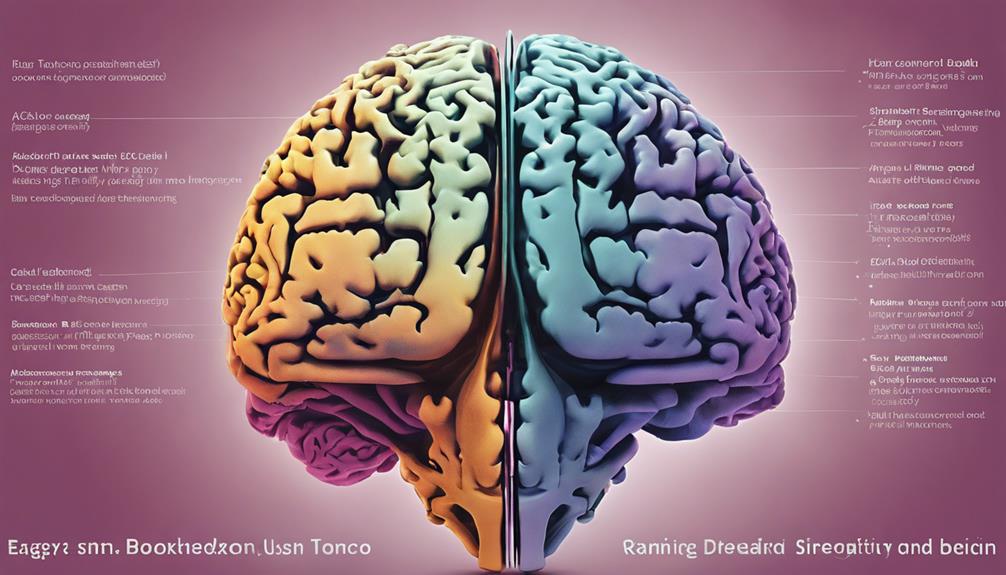Can you distinguish between a living will and an advance directive?
The answer might surprise you.
Understanding the nuances between these two crucial documents can profoundly impact the decisions made concerning your healthcare in critical moments.
Let's delve into the details to uncover the essential differences between an advance directive and a living will, potentially reshaping how you approach planning for your medical care.
Key Takeaways
- Advance directives encompass broader medical decisions.
- Living wills focus on end-of-life treatment preferences.
- Advance directives include mental health care preferences.
- Both ensure healthcare wishes are honored and aid in informed decisions.
Overview of Advance Directives and Living Wills
In understanding advance directives and living wills, it's crucial to grasp the nuanced differences between these legal instructions for future medical care preferences.
Advance directives encompass a broader category of legal documents that allow individuals to make decisions about their health care wishes in advance. Within advance directives, various types exist, such as medical power of attorney, mental health care directives, and Do Not Resuscitate (DNR) orders.
On the other hand, living wills are a specific type of advance directive that focuses on outlining treatment preferences, refusals, and end-of-life arrangements in situations like terminal illness.
Understanding Living Wills

Understanding the importance of living wills is crucial in ensuring your end-of-life treatment preferences are clearly documented and respected. Living wills are legal documents that detail an individual's wishes concerning medical care in critical health situations. These advance directives address scenarios like terminal illnesses, permanent unconsciousness, and cognitive decline, guiding healthcare providers on the appropriate course of action.
By outlining preferences regarding life-prolonging measures, comfort care, and end-of-life arrangements, living wills ensure that your healthcare decisions align with your values and beliefs even when you're unable to communicate. It's essential to discuss your wishes with loved ones and designate a power of attorney (POA) to ensure that your directives are followed.
Having a living will in place provides peace of mind and empowers you to make decisions about your end-of-life care, giving you a voice in critical medical situations.
Exploring Advance Directives
Navigating end-of-life decisions can be complex, and as we consider the importance of living wills, it becomes evident that exploring advance directives offers a broader perspective on planning for future medical care preferences. These legal documents not only ensure that individuals’ wishes are respected but also relieve loved ones of the burden of making difficult medical decisions during emotionally charged times. The importance of planning for end of life cannot be overstated, as it provides clarity, guidance, and peace of mind for both the individual and their family. By discussing personal values and preferences early on, people can ensure their end-of-life care aligns with their beliefs, even if they are unable to communicate them in the future.
- Advance directives encompass a broader category of legal instructions for future medical care preferences, including living wills.
- They become effective when an individual is unable to communicate their healthcare decisions due to events like coma, dementia, or stroke.
- Advance directives may also include a medical Power of Attorney (POA) designation to make healthcare decisions on behalf of the individual.
- These directives can address mental health care preferences in addition to medical treatment choices.
Understanding advance directives is crucial for ensuring that one's health and end-of-life care preferences are respected. By creating these legal documents, individuals can designate a trusted healthcare agent to make decisions on their behalf when they're unable to do so. These state-specific estate planning tools provide peace of mind and ensure that one's wishes regarding future medical care are known and followed.
Contrasting Living Wills and Advance Directives

Let's delve into the distinctions between living wills and advance directives to grasp the nuances of these crucial legal documents.
Living wills serve as estate planning tools that specifically address end-of-life treatment preferences in situations like terminal illnesses, permanent unconsciousness, and cognitive decline. On the other hand, advance directives encompass a broader range of medical decisions beyond just end-of-life scenarios, covering any credible threat of dying.
While living wills focus on specific healthcare wishes for the end of life, advance directives extend to various medical treatments in different contexts. Both living wills and advance directives aim to outline healthcare preferences if one becomes incapacitated, albeit with different scopes.
Importance of Advance Directives and Living Wills
As we explore the significance of advance directives and living wills, it becomes evident that these legal documents play a crucial role in ensuring our healthcare preferences are respected when we're unable to communicate them directly. When considering the importance of advance directives and living wills, we recognize the following key points:
- Advance directives encompass a broader category of legal instructions for future medical care preferences beyond terminal illness.
- Living wills specifically focus on outlining end-of-life treatment preferences in scenarios like terminal illnesses and cognitive decline.
Both advance directives and living wills aim to ensure that an individual's medical care wishes are honored when they're unable to communicate decisions.
Having both an advance directive and a living will as part of comprehensive estate planning can help in making informed medical care decisions and ensuring that wishes are followed.
Frequently Asked Questions
What Is Another Name for a Living Will?
Another name for a living will is an advance directive for medical care. It specifies healthcare wishes in case of incapacitation, providing clarity and guidance for loved ones and healthcare providers.
This legal document outlines preferences for medical treatments and end-of-life care, ensuring that one's wishes are followed. Having a living will is crucial for maintaining control over one's healthcare decisions and can ease difficult situations for all involved.
What Is the Main Disadvantage of a Living Will?
The main disadvantage of a living will is its limited scope, focusing primarily on end-of-life treatment preferences. It may not cover all potential medical scenarios beyond terminal illness, leading to conflicts or confusion if circumstances change or new options arise.
The rigidity of a living will doesn't allow for real-time decision-making or flexibility in unforeseen medical situations, hindering its ability to address evolving healthcare needs or preferences over time.
Is an Advanced Directive the Same as a Dnr?
No, an advance directive isn't the same as a DNR order.
While an advance directive is a comprehensive legal document outlining healthcare wishes, including preferences for life-sustaining treatments like CPR, a DNR order is a specific directive within an advance directive instructing healthcare providers not to perform CPR.
It's essential to understand the distinctions between the two to ensure your medical preferences are accurately communicated and respected.
What Are the 3 Categories That Advance Directives Usually Fall Into?
When it comes to advance directives, they typically fall into three main categories:
- Living wills outline end-of-life treatment preferences during terminal illness.
- Medical power of attorney appoints a healthcare proxy to make decisions for an incapacitated individual.
- Don't resuscitate (DNR) orders direct healthcare providers not to perform CPR in the event of cardiac arrest.
These categories ensure that healthcare wishes are respected when communication is compromised.
Conclusion
In conclusion, understanding the difference between an advance directive and a living will is crucial for ensuring our healthcare wishes are respected.
Like a compass guiding us through uncertain terrain, these legal documents provide clarity and direction for our medical care in times of incapacity.
Let's take the time to discuss and prepare these important documents, so our voices can be heard even when we can't speak for ourselves.









